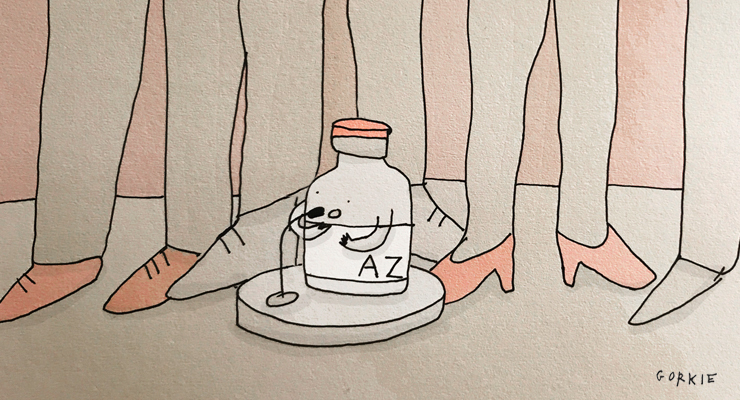
Is AstraZeneca the Britney Spears of COVID vaccines? AstraZeneca in Australia has the same problem Spears has in the United States — too little voice and too many other people making decisions to determine their future.
Spears only very recently finally spoke out publicly against an oppressive conservatorship that is dictating her personal life and her professional brand.
Meanwhile in Australia, AstraZeneca has effectively been silent in public in the face of concerns over rare side-effects and criticism of the local vaccine rollout.
Combine the drug-maker’s apparent passive stance with reported safety issues plus legal action in Europe — along with what Gerry McCusker called a “seemingly tame PR defence of its brand reputation” — and it’s not hard to understand why the Australian federal government decided that after October 2021 the AstraZeneca vaccine will be available only on request.
Of course, AstraZeneca is not the only vaccine to come under suspicion — both from committed anti-vaxxers and the vaccine-hesitant — but it has effectively become a lightning rod for everything that has gone wrong with COVID in Australia.
By contrast, in the UK the AstraZeneca vaccine is hailed as a public health success story. Professor Sarah Gilbert, the Oxford University scientist who led its development, was created a dame in the Queen’s Birthday Honours list and received a spontaneous standing ovation from the crowd at Wimbledon.
Part of that support in Britain — where it is more commonly known as the Oxford Vaccine — can probably be put down to chauvinism and national pride. Yet recent data shows the AstraZeneca vaccine is being used in about twice as many countries around the world as the Pfizer runner-up.
That’s hardly a surprise given its efficacy, easy storage, strong supply, and the fact that the Oxford/AstraZeneca joint venture committed to provide the vaccine “at cost” globally throughout the pandemic, and to middle- and low-income countries in the developing world “in perpetuity”.
In any normal circumstances those facts alone would be powerful building blocks for successful issue management. But the reality is that a decision to “let the facts speak for themselves” is rarely a winning strategy.
The American academic John Mahon has championed the concept of “reputation sets” — with reputation being not a singular entity but varying widely for different audiences. That is certainly the case for the reputation of AstraZeneca in Australia, despite success elsewhere. As McCusker put it: “In Australia, the AstraZeneca name is at the apex of vaccine hesitancy, therefore at risk of sustained reputation erosion.”
While we must assume AstraZeneca is lobbying and commenting behind the scenes, the company appears to be missing in action in terms of publicly arguing its case and defending its name.
We don’t know what discussions and decisions have been made in the boardroom, but it seems clear public trust in the vaccine can not be restored without: a comprehensive and proactive communication strategy to tell AstraZeneca’s story in a human way; responding effectively to negative reports; and providing accurate information to reassure the public. The company might even try to rename the vaccine, in the same way the highly infectious Indian strain of COVID-19 was successfully rebranded as the Delta variant.
However, it’s also possible that no amount of effort could turn this reputational crisis around.
Britney Spears finally spoke out in a California courtroom late in June, appealing to regain control of her life and her brand. But the judge rejected her plea to ease the conservatorship.
In the same way, maybe it’s now simply too late for AstraZeneca to sway the court of public opinion in Australia.
This article is reprinted from Tony Jaques’s Managing Outcomes, a newsletter for people who work in issue and crisis management. Jaques is the director of Issue Outcomes Pty Ltd.








Australia has been so successful, so far, in minimizing infection and mortality that we can observe widespread complacency about vaccination. People have not felt any need to hurry, they have time to choose. They’ll wait for the possibly slightly less risky import that the government promises will be here soon – honest, would I lie to you?
The lack of positive marketing, I suspect, is down to the lack of supply. If the product is over-sold the public will blame the government when they can’t get vaccinated. Which might account for the feeble play-on-words video, which probably won’t work when translated. In any case, our own AZ production is not enough on its own, we still need to import in the short term.
And then the media need headlines.
Agree, all this media noise and chatter round AZ or Pfizer helps the government avoid scrutiny of sub-optimal sourcing, delivery and vaccination roll outs….
The development of this vaccine has been a fiasco from start ( wrong dose given) to finish ( the US trials)
https://medicalxpress.com/news/2021-03- reputation-astrazeneca-covid-vaccine-marred.html
https://www.msn.com/en-in/news/world/volunteers-in-astrazeneca-trial-given-wrong-dose-documents-reveal/ar-BB1diOxR
It surely didn’t help the public’s view of the AZ vaccine that the Prime Minister didn’t take it, though he was in the recommended age group.
Given the way everything he has touched has gone it certainly convinced me to have the AZ. An yes my good sense always tells me to go the opposite way to the shock jocks. AJ was a wedding singer at my sisters wedding and he never got invited back to any of the anniversaries. Says it all.
Is Morri$sin’s decision to make the AstraZeneca vaccine only available on request after October 2021 due to its less than fulsome defence of its product?… in the UK the AstraZeneca vaccine is hailed as a public health success story…Professor Sarah Gilbert, the Oxford University scientist who led its development, was created a dame in the Queen’s Birthday Honours list and received a spontaneous standing ovation from the crowd at Wimbledon.
Well that should reassure Peta Credlin!
A standing ovation at Wimbledon – well that clinches the matter, game set and match.
”While we must assume AstraZeneca is lobbying and commenting behind the scenes, the company appears to be missing in action in terms of publicly arguing its case and defending its name…The company might even try to rename the vaccine, in the same way the highly infectious Indian strain of COVID-19 was successfully rebranded as the Delta variant. .. maybe it’s now simply too late for AstraZeneca to sway the court of public opinion in Australia.”
TG reports that by March 2021 Norway, Denmark, the Netherlands and Ireland stopped using it and Italy, Austria, Estonia, Latvia, Luxembourg and Lithuania stopped inoculations from one particular batch of 1m doses that was sent to 17 countries.